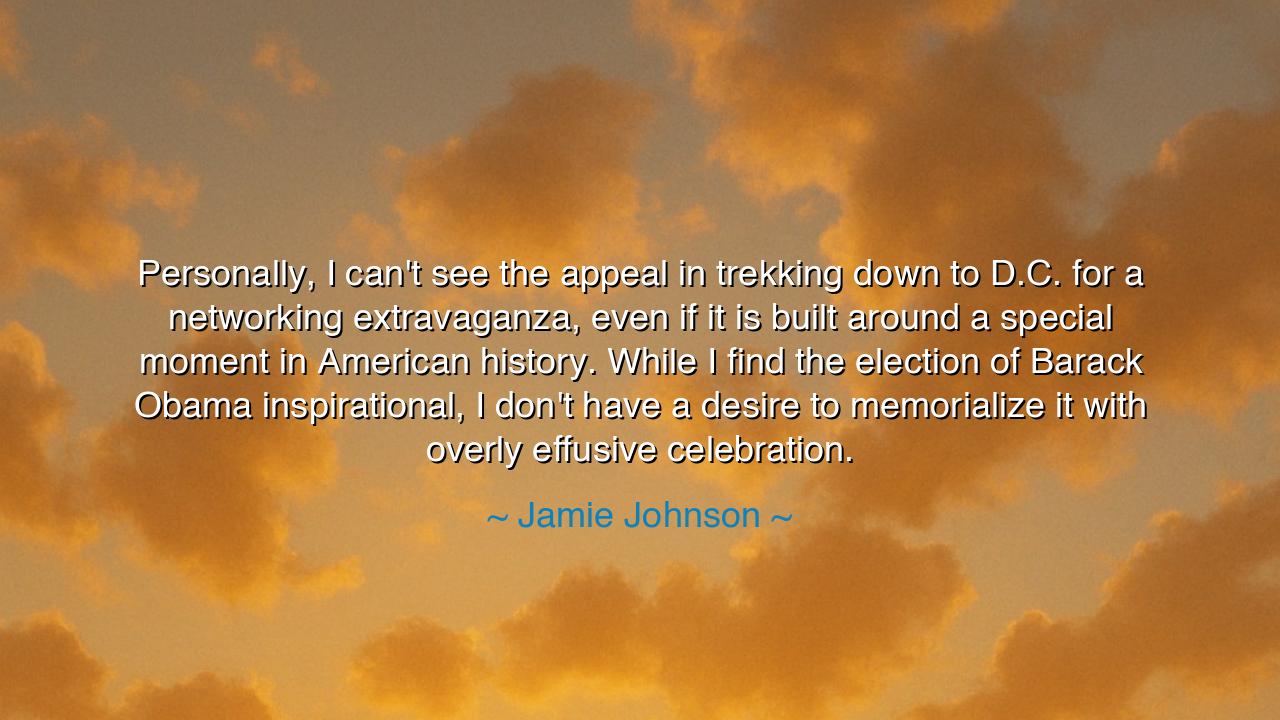
Personally, I can't see the appeal in trekking down to D.C. for a
Personally, I can't see the appeal in trekking down to D.C. for a networking extravaganza, even if it is built around a special moment in American history. While I find the election of Barack Obama inspirational, I don't have a desire to memorialize it with overly effusive celebration.






In the measured and introspective words of Jamie Johnson, we hear the voice of a man who values reflection over spectacle, sincerity over ceremony: “Personally, I can't see the appeal in trekking down to D.C. for a networking extravaganza, even if it is built around a special moment in American history. While I find the election of Barack Obama inspirational, I don't have a desire to memorialize it with overly effusive celebration.” Here, beneath the calm tone of self-restraint, lies a timeless wisdom — a call to honor meaning without drowning it in excess. Johnson speaks not against joy, but against the vanity that often cloaks itself in virtue. His words remind us that true inspiration is quiet, internal, and enduring, not always found in parades and proclamations, but in the steady pulse of gratitude and purpose that continues after the cheering ends.
The meaning of his reflection lies in the contrast between inspiration and indulgence. He acknowledges the profound historical weight of Barack Obama’s election — a milestone that carried with it the triumph of hope, progress, and unity. Yet he chooses to honor that event not with outward extravagance but with inward contemplation. In this, he speaks for all who understand that reverence need not be loud. For there is a kind of wisdom in restraint, a nobility in the soul that celebrates not through noise, but through renewed resolve. To truly honor greatness, Johnson implies, is not to worship it from afar, but to let it refine one’s own life in silence.
The origin of such thought is deeply ancient. From the temples of Greece to the deserts of Judea, the wise have always warned that excess — even in virtue — leads to blindness. The philosopher Epictetus taught that “wealth consists not in having great possessions, but in having few wants.” Similarly, the sage Lao Tzu counseled that those who boast of goodness no longer possess it. Johnson’s disinterest in “networking extravaganzas” and “overly effusive celebration” echoes this ancient caution — that the truest reverence for an event of moral beauty lies not in public display but in personal transformation. For history’s milestones are not trophies to be admired; they are mirrors in which each generation must see itself and ask: “How shall I live differently because of this?”
We might recall the Roman general Cincinnatus, who, after saving his republic, returned quietly to his farm rather than revel in power or ceremony. His humility became legend because it spoke to the eternal principle that honor does not demand attention. In much the same spirit, Johnson’s words carry the humility of one who knows that the value of a historical moment lies not in its spectacle, but in its consequence. What matters is not how loudly one celebrates the dawn, but how faithfully one walks in the light it brings.
His observation about the “networking extravaganza” also reveals a sharper critique of modern society — a world that often confuses participation with presence, and spectacle with sincerity. There is a danger, he suggests, in turning even sacred events into opportunities for self-promotion or social standing. The moment when the world should pause in shared reflection becomes instead a marketplace of attention, where meaning is diluted by noise. Here, Johnson’s restraint becomes a moral stance — a quiet act of rebellion against a culture that values being seen more than being sincere.
Yet within his reflection there is no bitterness, only clarity. He still calls Obama’s election “inspirational,” acknowledging its power to uplift and unite. But he also understands that inspiration must lead somewhere. It is not enough to feel moved; one must be changed. The danger of “overly effusive celebration” is that it traps us in emotion and distracts us from action. The ancient Stoics knew this well — they taught that virtue lies not in fleeting excitement but in enduring discipline. True celebration, then, is not a weekend of applause but a lifetime of alignment with the ideals we claim to honor.
The lesson that arises from Johnson’s words is profound: learn to honor greatness with substance, not spectacle. When history gives birth to a moment of hope, do not lose yourself in its glow. Let that light enter you, warm you, and illuminate your own path. Reflect, do not merely rejoice. Build, do not merely bask. For as the ancients taught, gratitude without growth is emptiness, and celebration without purpose is noise.
So let the thoughtful soul follow Johnson’s example — to find inspiration in the quiet recognition of what is right, to resist the temptation to make every sacred thing a stage. Celebrate less in words and more in works; speak less of change and live it. For in the end, history remembers not the loudest voices in the crowd, but those who, after the music fades, continue the march toward a better world in the stillness of their own conviction.






AAdministratorAdministrator
Welcome, honored guests. Please leave a comment, we will respond soon